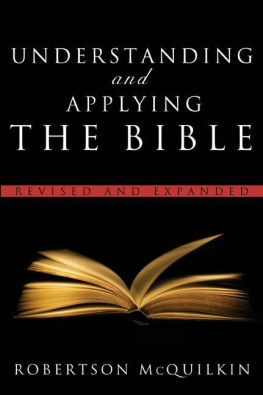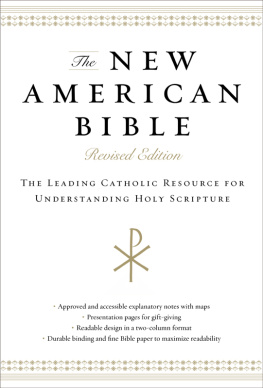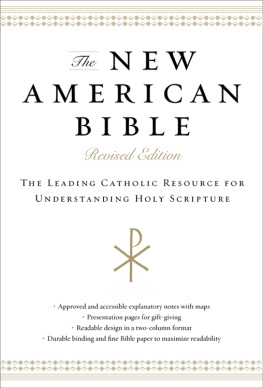
Table of Content
CHAPTER NINE
A Method for
Word Study
Guideline : Research each
unclear and important word.
Words are the basic building blocks for understanding the meaning of any passage. In seeking the author's intended meaning, we must consider the meanings of individual words. Their meanings, in many cases, are not always self-evident.
An example of the misunderstanding of words comes from a student who spoke at a Bible college chapel on the verse "I being in the way, the Lord led me" (Gen. 24:27 KJV). She took the expression "being in the way" as referring to her own resistance to the will of God. Although she felt she often stubbornly obstructed God's purposes ("being in the way") she also felt that God led her despite her obstruction because she was His child! Through the misunderstanding of words, the interpreter came to an opposite meaning of that intended by the author. She concluded that God will lead even when a person resists His will, whereas the verse says He will lead when we follow His precepts.
Why are words so troublesome? Because they seldom have a precise meaning that is identical in all contexts. Rather, they have a range of meaning, so that in one context an emphasis, or even a meaning, differs from that intended by the use of that same word in a different context. Even in one's native tongue, understanding another person is a constant exercise in interpretation.
In translation, the problem is compounded since a word in one language rarely means precisely what a word means in another language. For example, when Paul exhorts us to pray always, he literally said "all the time" (Eph. 6:18), and when Christ said He would be with us always, the literal words are "all the days" (Matt. 28:20). For our understanding of the intent, we would probably have reversed the choice of words. We would like to think that Christ is with us without interruption (all the time), and that we should pray on a daily basis, not without interruption (twenty-four hours a day). But the range of meaning in Paul's "all the time" can be from literal "without interruption" to "consistently"a general habit of life. The interpreter must discern which of the possible meanings Paul had in mind when he gave that exhortation.
Thus, the task of the translator is to define as precisely as possible the meaning of a word in the way the author used it in its specific context, and then search for a word or expression in his language that gives as nearly as possible that same meaning. The translator has done that as carefully as possible, but since the task is basically one of interpretation, the serious Bible student will make a direct study of every word that is crucial to the meaning of the passage he is studying. Sometimes a single word in translation will not do; an explanation might be necessary.
To say that there is a range of meaning does not mean that one can identify the whole range and then pick the meaning or nuance that best suits what he would like the author to have said. No, the author had a very specific meaning in mind. A word study will assist the interpreter in locating the range of meanings of a word; through a careful examination of the context, the student can identify the meaning in a particular text. If God the Holy Spirit took the care to inspire the very words, we must be careful to search out the intent of the author in his choice of words.
Biblical Words Used in a Special Sense
Because they are used in a special sense, technical words like justification , figurative words like death , and profound words like sin must be carefully studied. For example, the non-Christian society does not have a word for the biblical concept of love. Neither was there such a word in the days of the New Testament. Agape was used occasionally in the classics and emphasized the great value of the object loved, though it tended to be cold and intellectual. But the Holy Spirit chose that word rather than philia , eros , or storge and poured the divine meaning into it. By command, description, and example, a new meaning was given to an old word.
There are many elements in the biblical concept of love that the unregenerate world never discovers. For example, loving behavior depends on the quality or character of the one doing the loving, not on the worth or lovability of the object of love. Again, the emphasis shifts from love as a noun describing how one feels to the verb describing how one behaves toward another. That basic shift in meaning lays the groundwork for another basic truth concerning love. A person can behave lovingly, even though his feelings may not direct him to do so. There are many other elements in the biblical concept of love, but those cannot be known to the interpreter without a thorough study of the word.
The serious student of the Bible should make it a goal to study in depth all of the great words of Scripture. That kind of study would be the task of a lifetime, but it is one of the most exciting and profitable areas of biblical study.
Words Having More Than One Meaning
A word might not be instantly or fully understood because its wide range of meaning may span very different concepts. For example , death is a word that can be very confusing because it is used in many different ways. In a brief passage between Colossians 2:12 and 3:5, the word is used in four different ways. It refers (1) to the physical death of Christ; (2) to the fact that people are "dead" before they become Christians; (3) to people "dying" as they become Christians; and (4) to the idea that those who have died are now to "put to death" the deeds of the body. And that is just a beginning.
There are many other uses of the word death in Scripture. For example, Paul "died daily," and there is the "second death." It is of utmost importance to know the meaning. Great confusion has come to the church concerning how the Christian life is to be lived because Bible students have not taken care to study the various meanings to determine which meaning the author intended in a given passage. One must know all the potential meanings to understand the specific meaning within a passage.
Some basic problems are inherent because we are not studying Scripture in its original language. Even if we were, the problems inherent in translation are still present in the gospels because they render in Greek the original Aramaic that Christ and His disciples normally spoke.
Different Words in the Original May Be Translated by the Same English Word
Perhaps the word translated "love" in John 21:15-19 is the most famous illustration of that problem. When Christ asked Peter if he loved Him, Peter answered with a different word. That difference is indeed difficult to translate into English and, as a result, is not normally translated. Yet it is important to study the two words that are used. Milton Terry explains that there are four sets of synonyms in these verses, not merely the one on love, which is commonly known. 1
New is another important word in this category. In the Greek text, neos refers to a new existence (i.e., brand-new), whereas kainos refers to a new aspect, new depth, new fullness, or new scope. When Christ says, "A new commandment I give to you, that you love one another" (John 13:34), it is important for the understanding of that passage to know that John used kainos, a new aspect of an old command.
Another example of difficulty in translation comes from the use of the word perfect . One senses immediately the great theological importance of knowing that perfect does not always mean "absolute lack of any flaw." But to determine that, it is necessary to study all the words that have been translated "perfect" in our English Bible. Consider the following texts.
Next page









